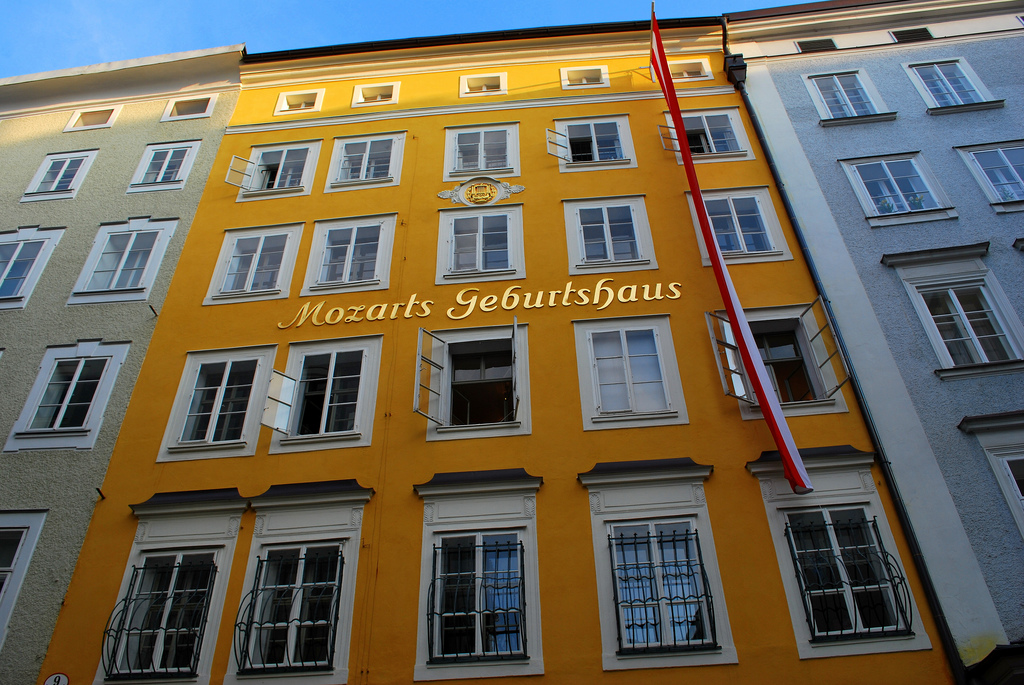The Hills are Alive With The Sound of Mozart
The Justin Bieber of classical music, remember?

Image: SorinNechita via Flickr
Happy 2018! It’s been a little while, hasn’t it? Even my very last column was technically written last year, so it’s nice to be diving in. You might be wondering where I went, and the answer: Bavaria. I know what you’re thinking: it’s January. And that’s so right. You’re 100% correct. It is January, and it is insane to travel to a place where it is also winter. But compared to my hometown of Chicago where on any given day it at best 4 degrees (today it is a BALMY 14), Bavaria, with its averages in the low 40s Fahrenheit, felt absolutely tropical.
If you’re wondering what precisely there is to do in Bavaria, let me tell you. You can eat a whole variety of sausages, cabbage, plus a lot of spätzle (topped with melted cheese). You can go to some old palaces. You can go to some modern art museums. And if you want, you can take a highly functional and short train ride to the city of Salzburg, Austria, which just so happens to be the birthplace of Wolfgang Amadeus Mozart.
Briefly, let me tell you about Salzburg. It’s in the Alps, a little city in a valley with a swift and cold river running through the center of it. It translates, quite literally, to salt mountain. There are salt mines. But it’s also possible you know Salzburg as the city where they shot The Sound Of Music. Now, I have never been all in on The Sound Of Music for reasons totally unknown to me, but in the midst of Salzburg’s modern art museum, they had it playing on 35mm and we managed to catch the good fifteen minutes. In the event you don’t know what the good fifteen minutes of The Sound Of Music are, they’re “My Favorite Things” directly into “Do Re Mi” and then you get the hell out. I will say that this part, specifically, made me cry for approximately four seconds.
Anyway. Mozart’s birthplace—Mozart’s Geburtshaus, if you will—is a bright yellow house in the midst of the historic part of Salzburg. You trek up the steps, you pay the fee, and you wander through the small wooden rooms of Mozart’s childhood home. There’s not really any meticulously preserved furniture or beds or anything like that. Most of what you find are a collection of paintings, letters, and a handful of instruments. But still, I found myself oddly emotional. Maybe because in his childhood home, it wasn’t all about him. He hadn’t become a celebrity yet, not fully, not yet.
Here is the part where I also feel obligated to tell you Mozart’s birthplace had a lock of his hair. I’m not sure what else to say about it. It looked like hair. The fact that it was a trend in the past to give someone a lock of your hair to show love is, uh, pretty interesting, and as someone who is very grossed out by disembodied (??) clumps of hair, I’m glad this trend is dead.
The Mozart piece I want to discuss, albeit briefly, this week is his Symphony No. 41, also known as his Jupiter symphony. It was his last symphony composed, and therefore he did not write it in his birthplace nor in Salzburg at all. But it does sound decidedly modern to me. Prior to visiting Mozart’s birthplace, it had always been easy for me to other him in terms of composers I liked. Yes, there was Beethoven and Brahms and Tchaikovsky and the like. These were the ones who experimented and pushed and pulled with what society expected from popular Classical and Romantic music. And Mozart, he was the guy who basically just wrote the rulebook and died young. But his birthplace felt shockingly modern. Maybe it was the letters. Playful little anecdotes to his father or his sister or his wife, full of inside jokes and affection. Jupiter feels this way to me too, now. Laughing and light and expressive, not just another play on form. It feels as decidedly new and bold as something this could—the textured brassy and percussive finale of the Molto Allegro altogether deserve of the loudest volume you can stand.
The last thing I will tell you is that directly next door to Mozart’s birthplace is an H&M. How you feel about that is a pretty fair metric for how you feel about Mozart, I think.
